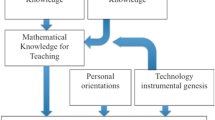Conclusions
Due to the small numbers, this study should be viewed as an illuminative pilot study. The main points arising are:
-
.
Students who did not achieve a high level of concept mapping mastery showed no significant improvement in performance on normal classroom end-of-unit achievement tests.
-
.
over half of the students who achieved a high level of concept mapping mastery also showed a significant improvement in performance on normal classroom end-of-unit achievement tests, and,
-
.
concept mapping should be incorporated into the ongoing classroom instruction patterns if performance gains are to be maintained.
Similar content being viewed by others
References
NOVAK, J.D. (1981),The Use of Concept Mapping and Gowin's “V” Mapping. Instructional Strategies in Junior High School Science. Cornell University Press, Ithaca.
TISHER, R.P., POWER, C.N. & ENDEAN, L. (1972),Fundamental Issues in Science Education. Wiley and Sons, Sydney.
Rights and permissions
About this article
Cite this article
Fraser, K., Edwards, J. The effects of training in concept mapping on student achievement in traditional classroom tests. Research in Science Education 15, 158–165 (1985). https://doi.org/10.1007/BF02356538
Issue Date:
DOI: https://doi.org/10.1007/BF02356538



